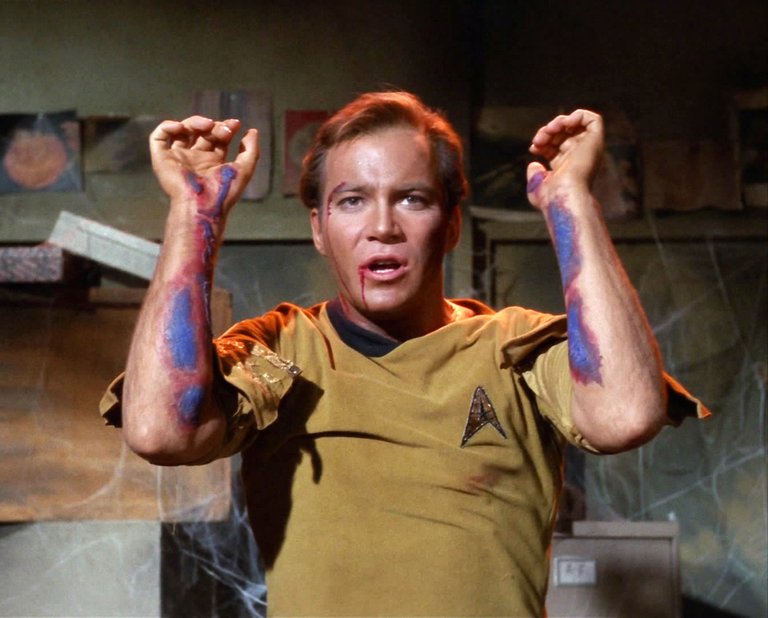
Miri (S01E11)
Airdate: October 27th 1966
Written by: Adrian Spies
Directed by: Vincent McEveety
Running Time: 50 minutes
The Baby Boomer generation, emerging in the aftermath of World War II, grew up in a world that was markedly different from anything that had come before. This transformation fostered new attitudes and mores that often appeared alien and, at times, threatening to the older generations. This generational shift began to manifest in various cultural expressions, including science fiction. Films such as Village of the Damned depicted children as antagonists, reflecting societal anxieties about the changing dynamics of childhood and adulthood. This trend found its way into Star Trek: The Original Series, particularly in the episode Miri, which presents an intriguing yet ultimately disappointing narrative that encapsulates these generational tensions.
Set in 2266 AD, the plot of Miri begins with the USS Enterprise responding to a distress call that leads them to a planet strikingly similar to Earth. Captain Kirk, along with Spock, McCoy, Yeoman Rand, and two security officers, lands on this eerily familiar world only to discover remnants of 1960s architecture marred by centuries of neglect. Their exploration quickly turns perilous when they encounter a strange humanoid creature that soon succumbs to its injuries. This creature is identified as a "Grup," a term used for adults who have been driven mad by a virus that affects only those who reach puberty. The majority of the planet's inhabitants are "Onlies," children who have been spared from this fate due to a virus that halts their aging process. With the help of Miri (played by Kim Darby), an "Onlie" girl, the crew learns that once these children eventually mature, they succumb to the same madness as the Grups. As Kirk's team becomes infected and races against time to find a cure within seven days, they face opposition from Jahn (played by Michael J. Pollard), the leader of the Onlies, who perceives them as threats.
Miri was notably a favourite among the cast and crew, primarily because it allowed William Shatner, Grace Lee Whitney, and Gene Roddenberry to bring their children onto set, casting them as Onlies. The episode showcases commendable performances from its actors, particularly Kim Darby, who convincingly portrays Miri as she navigates the complexities of transitioning from childhood to adulthood. Despite being only 19 at the time of filming, Darby embodies her character's innocence and emerging maturity with remarkable depth. Michael J. Pollard’s portrayal of Jahn adds another layer; although he was 25 years old at the time, his performance captures the essence of youthful defiance and desperation that characterises his role, delivering one of many performances that would make him one of the most recognisable character actors of late 20th Century.
The premise of Miri, which examines children forced into perpetual childhood while adulthood becomes synonymous with death, serves as a powerful metaphor for the generational gap that emerged during the 1960s. It reflects societal concerns surrounding puberty and maturation in an era marked by rapid change and rebellion against traditional norms. However, despite its intriguing concept, Adrian Spies’ script lacks inspiration; the pacing is agonisingly slow despite moments of suspense. The romantic undertones between Kirk and Miri add some interest but do little to elevate the overall narrative. The development of a love triangle involving Yeoman Rand further complicates matters but ultimately feels like an unnecessary distraction.
A significant flaw in Miri lies in its setting on a planet that is virtually indistinguishable from Earth yet appears frozen in time within the 1960s aesthetic. This choice stemmed from producers' attempts to economise on production costs by recycling sets from The Andy Griffith Show. The lack of any explanation for why this planet mirrors Earth so closely detracts from its credibility and has led to contradictory interpretations in various apocryphal Star Trek novels.
Despite these shortcomings, Miri remains engaging due to strong performances and moments of genuine suspense throughout its runtime. However, discerning fans may find themselves frustrated by how much more compelling this episode could have been had it fully realised its thematic potential. While "Miri" offers an interesting glimpse into societal anxieties surrounding youth and maturity during a transformative era in American culture, it ultimately falls short of delivering a cohesive narrative that does justice to its premise.
RATING: 5/10 (++)
Blog in Croatian https://draxblog.com
Blog in English https://draxreview.wordpress.com/
InLeo blog https://inleo.io/@drax.leo
InLeo: https://inleo.io/signup?referral=drax.leo
Hiveonboard: https://hiveonboard.com?ref=drax
Rising Star game: https://www.risingstargame.com?referrer=drax
1Inch: https://1inch.exchange/#/r/0x83823d8CCB74F828148258BB4457642124b1328e
BTC donations: 1EWxiMiP6iiG9rger3NuUSd6HByaxQWafG
ETH donations: 0xB305F144323b99e6f8b1d66f5D7DE78B498C32A7
BCH donations: qpvxw0jax79lhmvlgcldkzpqanf03r9cjv8y6gtmk9